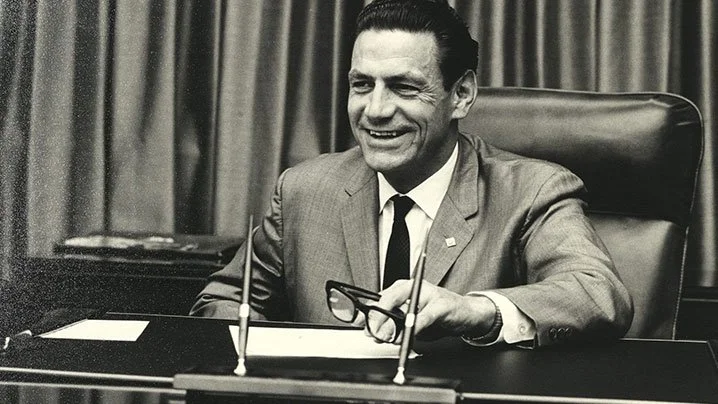Senator Harold Hughes, 1974
World War II combat vet in North Africa and Sicily, Truck Driver, Founder of the Iowa Better Trucking Bureau, Member of the Iowa Commerce Commission (1958-1962), Governor of Iowa (1963-1969), Iowa Senator (1969-1975), Christian Evangelist, Active in Alcoholics Anonymous 1955- 1996).
Seminal events in his life: grew up in poverty, death of older brother in 1940, WWII combat experience, near suicide attempt driven by despair over drinking resulting in a religious awakening in 1952, assinations of John Kennedy, Martin Luther King and Robert Kennedy, discovering that President Johnson et al had been lying about the war in Vietnam.
Events connected to Pacem in Terris recognition
Hughes, based on his deep commitment to the Thou Shalt Not Kill Commandment and what he had experienced during combat in WWII, was strongly opposed to the death penalty.
In 1963, Hughes became involved in the controversial execution of Victor Fager scheduled to be done at Fort Madison. Victor Feguer, originally from Michigan, had kidnapped and killed a young Dubuque doctor across state lines resulting in a Federal murder charge. Originally, determined to be executed at the Ft. Leavenworth federal prison in Kansas, the execution was moved to Iowa. Hughes was morally opposed the death penalty. He called President John Kennedy to ask for a commutation from the death sentence to life in prison. Hughes argued although the man was technically sane - he knew the difference between right and wrong, Fager had other mental health issues. Hughes thought Kennedy should take that into account and commute his sentence to life in prison. Kennedy rejected Hughes' request citing the brutality of the act. Fager was executed by hanging on March 15th 1963. He was the last prisoner to be executed in Iowa.Witnessing the hanging was John Ely, Iowa Democratic Senator who partnered with Hughes to end the death penalty in Iowa in 1965.
Opposition to the War in Vietnam
Hughes originally supported the Vietnam war but by 1967, despite his close friendship with President Johnson, he had come to oppose the war. He had learned from a number of sources that the President and those around him had been lying to the public about the war. Hughes led a group of governors to Texas to confront LBJ about lying about the war. The meeting was highly contentious, including an episode where Hughes and Johnson stood up toe to toe in heated exchange. The meeting and confrontation ended their friendship. After the meeting, Johnson told colleagues that “Hughes is just a plain damn failure.”
Hughes announced that he would not seek re-election as governor. He intended to retire from public service until Robert Kennedy convinced him to run for the Senate to further anti-war and civil rights causes. Later Kennedy flew to Des Moines to support Hughes’ candidacy for Senate.
Hughes brought seven other governors to Des Moines to convince Kennedy to run for president against Johnson. The group met with Kennedy throughout the night. Five days later Kennedy announced he was running for the presidency. His announcement and the primary in Wisconsin contributed to Johnson’s decision in March not to seek re-election.
After Kennedy’s assassination, Hughes switched his support to Eugene McCarthy and nominated him at the tumultuous 1968 Democratic Convention. Hughes was now fully identified with the anti-war wing of the Democratic Party.
In Sept of 1973, Hughes announced he was retiring from the Senate to dedicate himself to full-time Christian Ministry work. He did return to Iowa in 1980. He was invited back by the UAW in Newton, Iowa to speak. Hughes warned the crowd about the growing and dangerous connection between Evangelical Christians and right wing politicians. Hughes was awarded the Pacem in Terris in 1974.
By Dr. Randy Richards

